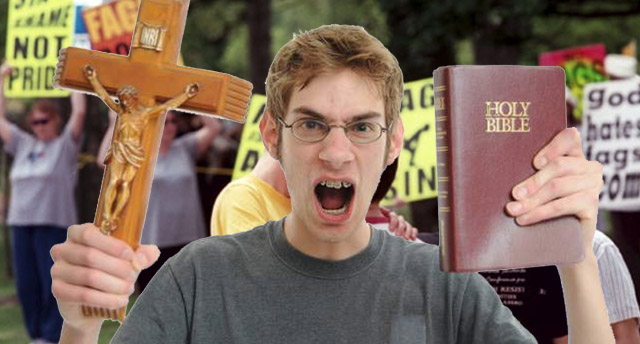With the upcoming release of the next entry in the Dresden Files series, I’d like to take the time to look at modern fantasy series and their portrayal of Christians and Christianity. As an audiobook listener, I’ve come to appreciate James Marsters’ rendition of each of the Dresden books, so it’s in tribute to him that I’ve chosen to start with Buffy the Vampire Slayer.
I love urban or modern-setting fantasy. I think the complexities of the modern world enhance the classic “magic and monsters” nature of high fantasy, and add infinite possibilities for world-building. One such complexity that has always been a hot issue for me is the portrayal of Christianity and Christians in urban fantasy. Now, spoiler alert: I am a Christian.

This isn’t the part where I spend the next paragraph proselytizing, and I’m certainly not going to warn off the “children of God” from exposing their children to media that includes spoOooOky black magic. I don’t actually think a modern fantasy story needs to validate Christianity, I’m just of the opinion that it is a huge world-building blunder to not address Christianity when the setting is otherwise saturated with Christian symbols and allegory.
Hear me out: nonbelievers have one extremely powerful and compelling argument to justify not believing in God: God is supernatural. It’s absolutely ridiculous to the atheist that there is a supernatural being that is infinitely more powerful than humans, knows everything, created everything, and exists outside of the flow of time. That argument becomes significantly less compelling when you, say, fight demons and the spawn of hell with crosses and holy water.
If you’ve made it this far, I’m going to assume that you’re at least generally familiar with the subject matter of Buffy the Vampire Slayer. The title character spends her free time fighting vampires and demons as a sort of “chosen one”, trying to prevent the opening of a portal to hell (or “a” hell). Buffy and her allies use, among other tools, crosses and holy water to defend themselves against their supernatural and evil foes, despite the fact that none of them demonstrate or subscribe to Christian faith. Buffy herself admits that she’s not certain if God even exists, and nobody seems sure why their arsenal is so effective against the undead, despite the abundance of obviously Christian symbols.
This trend of willful neglect to the Christian influence in the show’s world takes a far more negative turn when Caleb is introduced. Caleb is the highest profile character with a significant link of Christianity (his history as a priest), we are reminded of this by his clothing (that of a Catholic Priest), and he just so happens to be a vicious sociopath and right hand of the First Evil. The show takes a sudden turn from complete neglect of the fact that Christianity is a real thing in the world, to introducing the character with the most Christian influence as a serial killer who serves the ultimate “big bad guy”.
The sort of inconsistency required to appropriate Christian relics as symbols of power to fight evil, but to refuse to acknowledge Christianity except as a loosely referenced past to a psychopathic antagonist is a significant world-building error. It reeks of the writer allowing their own bias against Christianity to bleed into their work in a way that is inorganic to the subject matter.
Perhaps the writer is unaware of this, or it’s done intentionally as a way to avert controversy or to pander to an audience the writer/producer anticipates is largely non-Christian, but regardless of the reasoning, it shows a significant flaw in the development of this modern fantasy setting. Again, I don’t require that a modern fantasy setting validate Christianity, but to appropriate symbols and lore from Christian belief as symbols of power and then invalidate the faith and associate it exclusively with the bad guys is something I cry foul at.
Tune in next week for my look at Christian influence and portrayal in The Dresden Files. Maybe in two weeks. Actually, let’s just play it by ear. Don’t call us, we’ll call you.